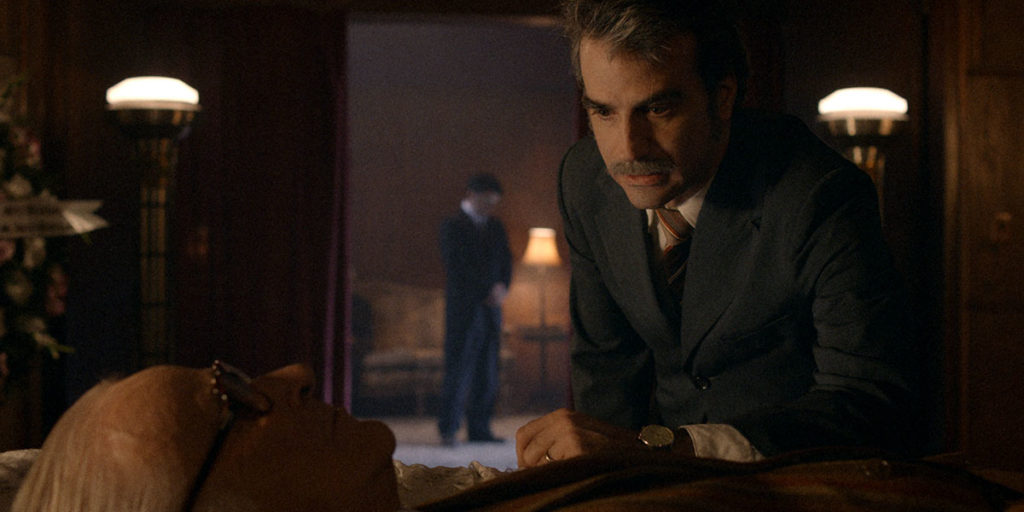Reviews include Irena’s Vow, The Beast, and Before I Change My Mind.
TIFF 2019: Caveat Emptor
September 18, 2019
“Let the squatter beware.”

While opulence enveloped the well-groomed marquee figures circulating the 2019 Toronto International Film Festival, the perils of material desire and class mobility provided thematic ballast in a number of its most compelling films. Among the most visible of these was South Korean writer-director Bong Joon-Ho’s hugely anticipated, Palme d’Or-winning, Grolsch People’s Choice Award-runner-up Parasite, a twist-laden, bleakly comical quasi-home-invasion thriller whose author requested spoiler-free commentaries when promoting the film during its Cannes debut. I for one caught up with Parasite during TIFF ’19 and was indeed grateful to come to it blind, so for the purposes of this survey I will simply point out that the film, while prompting a refrigerator question or two — let’s just say there are some dubious feats of accelerated housecleaning — is an ingeniously plotted social commentary in which two families on opposite ends of Seoul’s socioeconomic stratum merge via series of deliciously shrewd hoodwinks. Criminal ingenuity is not rewarded, a lifetime of rage and suffering is unleashed upon a lifetime of pettiness and privilege, and the underclass seems doomed to remain underground.
A startlingly similar trajectory unfolds in Mexican writer-director David Zonana’s Platform selection Workforce, in which, poco a poco, a crew of poor labourers work their way into their rich employer’s luxury Mexico City crib. Chillier, more starkly formalist and less character-driven than Bong’s big-budget banger, Zonana’s feature debut is nevertheless an impressive work of bleak social determinism: one would be hard-pressed not to cheer on the appallingly mistreated labourers occupying the affluent dirtbag’s digs, yet Workforce suggests that the act of merely inhabiting the home of one’s exploiter can rapidly transforms one into an exploiter. Let the squatter beware.

The corrupting effects of wealth, comfort and prestige are also at the heart of this year’s Platform Prize winner, Italian writer-director Petro Marcello’s exquisitely realized Jack London adaptation Martin Eden, which follows the titular uneducated young sailor’s arduous self-actualization as writer — a desire prompted by his headlong pursuit of an aristocratic young woman who takes it upon herself to oversee Martin’s cultivation. Set in an unspecified era, Marcello and his collaborators’ beguiling weave of archival materials with original Super 16mm imagery yields a trove of wondrous, at times gnomic details — Martin’s giddy sniffing of his first stack of precious books; the soundless motif of two unidentified children dancing in the street; the grainy image of a sinking ship — without ever losing the thread of the ideological fluctuations surrounding and informing the characters or its protagonist’s somber picaresque, which steers him toward a confluence of romance and glory, decadence and despoilment, that recalls a few masterworks from Marcello’s fellow countryman Luchino Visconti.

No TIFF ’19 selection in my purview proved more explicit in its condemnation of the pursuit of capitalist gain than Uruguayan writer-director Federico Veiroj’s The Moneychanger, another strong Platform title. Following a string of charmingly eccentric, small-scale comic character studies—among them A Useful Life, which starred the late Montevideo film critic Jorge Jellinek, and The Apostate — Veiroj’s latest, based on the eponymous novel by Juan Enrique Gruber, is a period white-collar-crime film in which Humberto Brause, a decidedly nondescript young man of humble origin, becomes a deft money launderer sought out by a bevy of international clients.
Veiroj is clearly as invested in Brause’s peculiar, amusingly joyless apprehension of status and splendour as he is in analyzing his country’s unique role in South America’s tumultuous 1970s, but the special genius of The Moneychanger lies in the way it merges the characteristics of its protagonist with those of Uruguay: in a region riddled with flamboyance, violence and instability, it was the quiet, provincial little country almost no one pays attention to that you want to safeguard your blood money. Likewise, Humberto’s anemic exterior makes him an ideal embodiment of reliable discretion. (As a noir protagonist, Humberto inhabits a marginal territory occupied by the likes of Billy Bob Thornton’s Ed Crane in the Coens’ The Man Who Wasn’t There: the opposite of an antihero driven to extremes by uncontrollable passions, Crane is a suburb-dwelling barber who’s thinking about getting into dry cleaning.)

You might argue that Humberto is fundamentally innocent, childishly dazzled by the promised benefits of affluence, only to be drawn into a acts of fraudulence and worse. As the film’s opening recreation of Jesus turning over the moneylenders’ tables unambiguously suggests, capital is bad for the soul. Though, having met Veiroj a few times now, I’m confident his spirit will survive a step up in funding.



